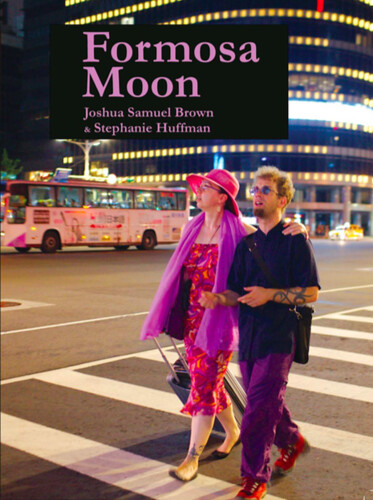Note: I'm super busy this month working on my final pre-dissertation paper for school, and it's a big one. So, Lao Ren Cha is going to be a bit quiet in November. Thanks for understanding!
I know that a huge part of the problem for pro-marriage equality advocates in Taiwan is funding: despite having fairly broad public support, they don't have a lot of money. Anti-equality hardliners, on the other hand, are pretty flush thanks to church donation networks (and international help from anti-equality religious groups, mostly from the US).
But, I have to say, I haven't seen much aggressive fundraising let alone the issue I tackle in my latest for Ketagalan Media: the fact that the bad guys are out-organizing us. They have more people on the streets, more fliers, more Line group invasive posting, more ads, more banners.
Banners and fliers cost money, and so do vests for volunteers if you want them. Ads are expensive. I get it - but I haven't seen much crowdfunding either.
You know what's free, though? Talking to people. Volunteers. Engaging in conversations in Line groups (if only to get the haters to keep quiet). Putting up designs drawn by volunteers for people to download and print out to make their own posters, placards and stickers.
In any case, in this piece I talk about the out-organization and how it makes it look as though pro-equality advocates are not standing up and getting votes for the upcoming referendum. I also cover the constitutionality of the anti-equality referendums and what the strategy might be behind them.
There's more to be said: the outright lies from the anti-equality camp, the attempt to rig the televised debates. I'm sure there will be more to talk about as the month goes on.
Monday, November 5, 2018
Wednesday, October 31, 2018
Come for the nudity, stay for the underpants: a book review of Lost Colony
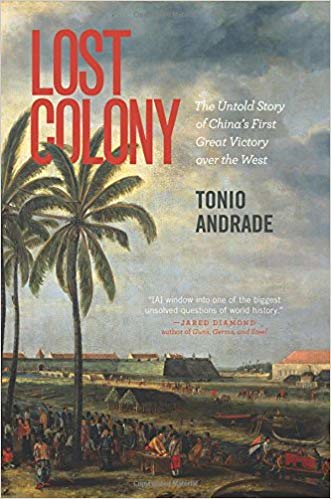 |
| Come for the nudity. Stay for the underpants. |
Drunken German traitors. Bum-waving Swiss farmers releasing streams of foul expletives. A missionary in dirty underpants. Naked swimmers, a Chinese general who (probably) had syphilis, slaps, mad rages, racist colonial caricatures getting all up in each others' grills, a two-timing translator/con-man, fire ships and booby traps (no actual boobies it seems, though). A war whose outcome may have been decided on the relative discipline and adaptability of each side's leaders, or on what technology and food supplies they had...or maybe it was just the weather.
These are the colorful details that illustrate Tonio Andrade's meticulous historical account of the defeat of the Dutch colony in Formosa by another kind of colonizer - Zheng Chenggong (Koxinga). Well, sort of - calling it "a meticulous historical account" is actually doing Lost Colony a disservice, although it could easily pass muster as an assigned text in an academic setting. It's also a rollicking good read.
Don't let that lull you into a belief that it's a light read, though. The book explores some heavy themes, ultimately challenging the old and, to be frank, kind of racist assertion that Western colonial powers won wars because they were more disciplined or had a technological or perhaps tactical edge. (Andrade doesn't call it racist; I'm calling it racist.) The central question is worth asking: if Western powers really had all of these advantages, and that's why they conquered so much of the world, how is it that they lost Taiwan?
Through the story, Andrade discusses and compares the relative merits of Dutch and Chinese warships, military technology (including artillery, weaponry and fortifications) and military strategy. He discusses the evolution of those ships, too, based on weather conditions sailing in the Atlantic and around Africa as opposed to Asia, with its monsoons. Don't think this means that Lost Colony is a boring military history though. It's got military elements - it kind of has to - but they don't slow down the story. Hell, I loved this book, and I'm just not that into military history.
This isn't because I'm a girl who doesn't like Big Manly Weapons because they're So Big and Manly, by the way. I grew up around guns and books on military history and have a healthy respect for firepower used intelligently.
Naw, it's because I'd rather we didn't need militaries at all. Too bad we don't live in that world. Anyway.
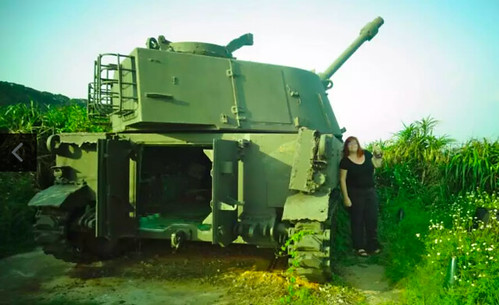 |
| I like...big...guns and I cannot lie (me & a howitzer from our trip to the Matsu islands) |
It's no wonder that writer Joyce Bergvelt chose to novelize it in Lord of Formosa (although Lost Colony was not available to her as a source when she did). I called that fictionalized account "cinematic in scope", and frankly, for a work of non-fiction, so is Lost Colony. Count me among those who say that this story should be made into a film as a way of exporting Taiwanese soft power abroad.
That's all well and good, you're saying, and I love a good story about conniving translator-businessmen and foul-mouthed bum-slappers, but how is historical account about something that happened in the 1600s relevant to my life?
Well, it's a well-worn adage among those who know Taiwan that the coming-to-Taiwan stories of Koxinga and Chiang Kai-shek share many parallels, which invites consideration of the present day seeing as the Republic of China has still unfortunately not given way to the Republic of Taiwan. I'm not going to talk about that, though, because everyone does. I'm more interested in how Andrade's telling of what happened when the military apparatus of a Western country met an Eastern one, and what that has to tell us about Taiwan's biggest foe.
The Art of War figures heavily in the narrative as well - and in fact, when hearing about the various axioms Koxinga was known to employ in practice, I could not help but think of the current tactics of the Chinese Communist Party in trying to convince the West that it is not an ideological foe - when it absolutely is - and bring Taiwan to heel.
By the time I got to the end, Andrade seemed to agree with me:
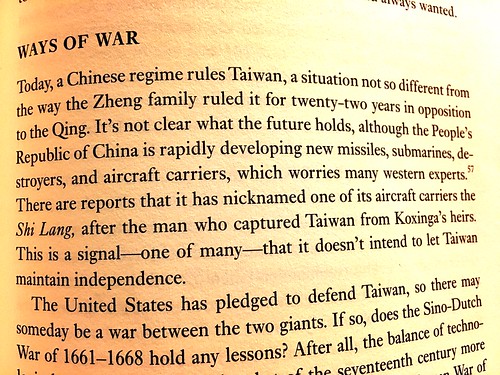 |
| "Today, a Chinese regime rules Taiwan"...I think I officially have an intellectual crush on Tonio Andrade. Freddy's still my guy in the end, though. |
After all, as Andrade notes, just because we think the West as a military advantage over China in terms of both technology and numbers - the US spends several times more on its military than China does - that doesn't necessarily mean we will win a potential future war. Frederick Coyet (the last colonial governor of Dutch Formosa who lost the war with Koxinga) had plenty of advantages - Renaissance fort architecture, big ships carrying heavy artillery that could sail at a closer tack against the wind than Chinese war junks, a potential alliance with Koxinga's enemy, the nascent Qing dynasty, and advice from Chinese defectors. For several potential reasons explored in the book, including a false belief in the superior discipline of his troops and his failure to listen and adapt, he lost anyway. We might too, and it's more than just Taiwan at stake.
Lost Colony tells its story with a remarkably clear-eyed look on the past. In much of Taiwan and parts of China, when Koxinga's conquest of Taiwan is discussed, there's an undertow of a sort of ethnic pride that one of their own (I suppose) kicked out the red-haired foreign colonizers.
The Dutch are no longer hated in Taiwan, per se - their colonial rule was so short-lived, involved such a small slice of Taiwan, and happened so long ago that it would be odd if they were - but Koxinga is seen by many as a hero. To be frank, it's a way of thinking I also find common to the Western left: of course someone like Koxinga would be the "good guy", relatively speaking. He was Chinese, Taiwan is Chinese (it's in Asia, anyway - same diff to a lot of Westerners), and Western imperialists were, and are, evil.
Western imperialism was and is evil, of course. Imperialism sucks. But this doesn't make Koxinga a comparatively "good guy" or a "hero". He was a warlord too - a colorful, brilliant warlord, to be sure - but still a conquering colonizer. The Chinese in Taiwan at the time were immigrants, not native inhabitants, and Taiwan subsequently became a settler state. Of course, your average Westerner probably has no idea who Koxinga was, but the big-picture implications of this kind of thinking are troublesome. Andrade understands this, I wish more Westerners (and Asians) did, too. He tells the story without picking sides. He made a case that we shouldn't dismiss the history of Asian military technology, training and strategy, while pointing out objectively who seemed to have advantages in what areas.
Andrade ends on an ominous note: the seventeenth century, when all of this took place, was one of the most tumultuous in human history, in part because of a spate of climate change that started wars, decimated populations and caused governments to be overthrown.
The climate change facing us in the twenty-first century, he notes, is likely to be several orders of magnitude worse than that. How will we face it?
Don't let all that doom-and-gloom scare you off, though.
There's also the aforementioned cursing Swiss bum-shakers, drunkenness, nudity, a fair number of references to testicles (one person got a cannon-ball shot straight through his) and a missionary in dirty underpants. There was a surprisingly detailed account of exactly how and when the Dutch, holed up in Fort Zeelandia, could go to the bathroom, and how often body parts got blown off by enemy fire in the process.
Read it because it's serious, but also read it because it's fun.
Thursday, October 25, 2018
Come to Pride this weekend
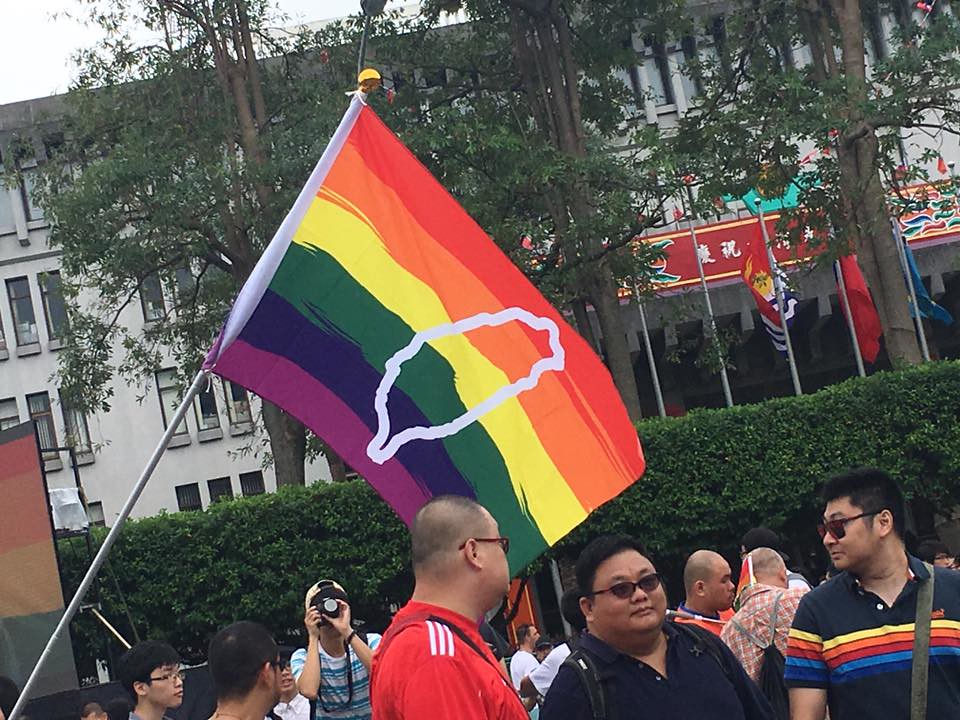 |
But, plans have changed, because Pride is this Saturday.
I'll still go to Donggang on Sunday, but it's really important that as many people as possible attend Pride this year. You should come too. And bring your friends!
In May 2017, Taiwan's highest court ruled that marriage is a right afforded all citizens with no reference to gender, and therefore marriage equality must be allowed. The court gave the government two years to work out a legislative solution: either to simply pass a law allowing marriage equality, or to change the civil code to abide by the ruling.
There have been some political ups and downs, some debate over which route is better (changing the law can likely be done quickly; changing the civil code is harder, and the ruling DPP doesn't think they have the support from the large socially-conservative-but-pro-independence segment of their base to make it happen.) There is a growing sense that the DPP hinted at support for marriage equality when campaigning, and promptly abandoned it to appease their more conservative base, and of course the KMT doesn't give a damn about anyone but the KMT. With elections coming up and the initial 2-year deadline now less than a year away, a lot of activists are upset.
This is especially important with two competing referenda coming up in about a month: one affirming Taiwan's commitment to equality, the other full of outdated, religiously-motivated and hateful garbage (yes, I'm biased). Remind people to go out and vote for love in November.
 |
| Meet at 1:30 at MRT National Taiwan University Hospital station, start out at 2:30 - these are the routes. I always go the red route. |
Cue Pride. With no specific marriage equality rallies planned, and the anti-equality gay-haters being very well-organized and resourced (moreso than the pro-equality side, although I would argue the national consensus is broadly with us if you count those who are not opposed to equality), there is a sense that this year's Pride is going to be more politically charged and all about showing the government that we (LGBT people and allies/supporters) haven't forgotten.
While it's not my place to opine on what Pride should be, I can say what I think it's likely to be - and that you should be there. A friend of mine (gay with a Taiwanese partner if it matters) was also saying he was hoping this year would be super politically charged and motivated. There's a sense in the air that this is what's happening, but we need numbers.
All are welcome at Pride, which means you can be a part of it. You can add to those numbers. You can make it clear that equal rights matter, and it's time for the government to stop pandering to prejudice and outdated, discriminatory thinking.
Pride Taipei usually makes international news - at least it has in the years surrounding the 2017 ruling, as the world watches to see whether Taiwan will be the first country in Asia to give equal marriage rights to all. The numbers do matter, and you do make a difference.
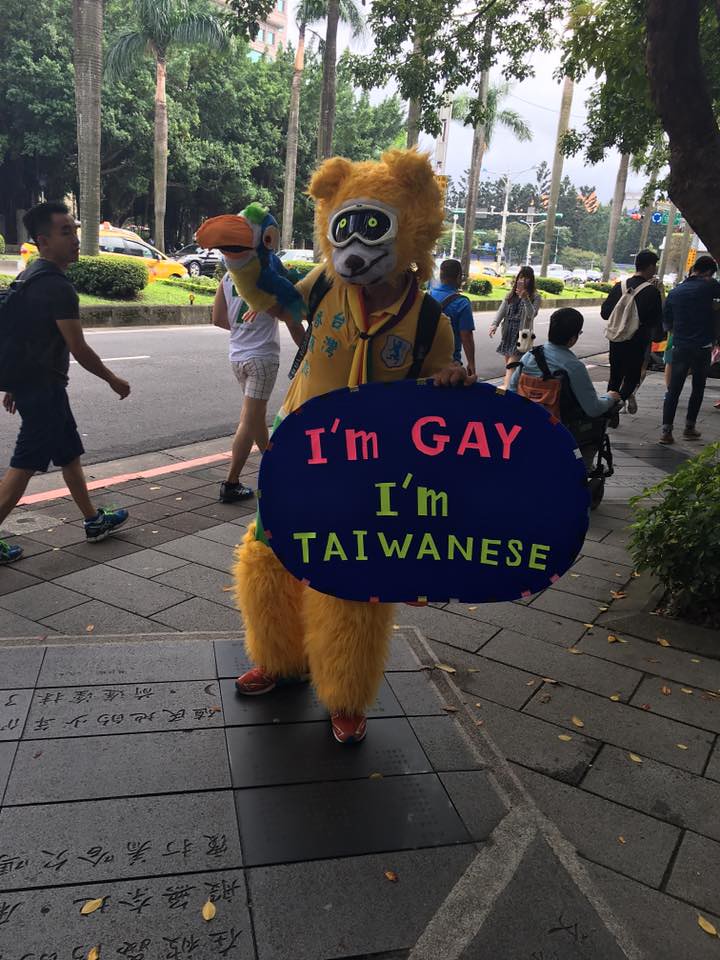
Show the LGBT community your support, and show the world that Taiwan, while imperfect, is the freest and most progressive country in Asia. Show them that we can do this, and that there is no reason why equality can't exist within Taiwanese culture.
Pride is not a rally or a protest - it's a celebration, and all are welcome. It's a great way for foreign residents, even if you are a bit reticent to attend actual protests, to show their support for this issue.
Grab your rainbow gear and come with us.
Swedish citizen Gui Minhai has been held by China for three years and Sweden has been super weird about it
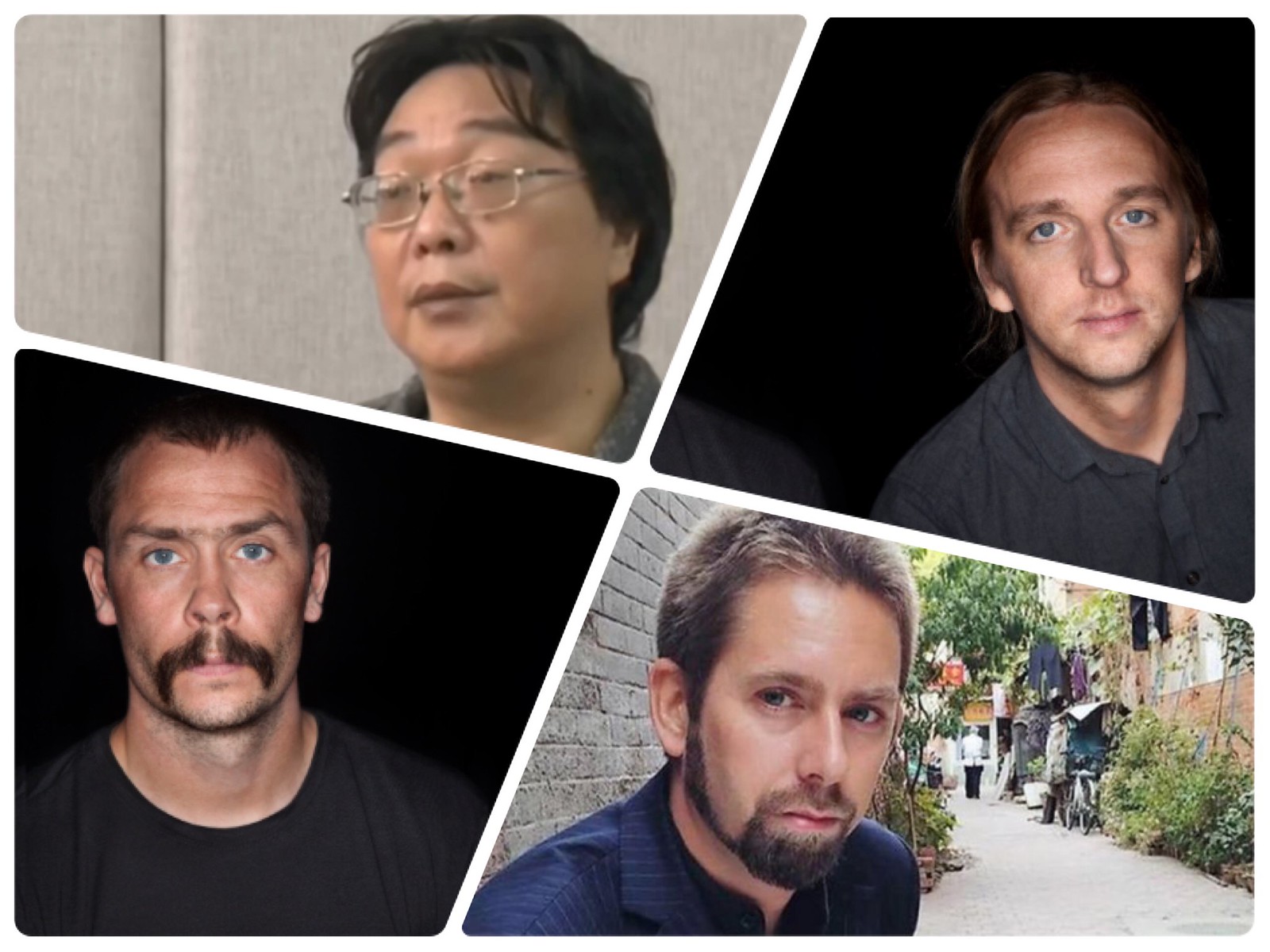 |
| Gui Minhai, Martin Schibbye, Johan Persson, Peter Dahlin |
Taipei-based Swedish journalist Jojje Olsson held a talk last week on the case of Gui Minhai. Gui is a Swedish citizen abducted from Thailand by the Chinese government who, beyond some limited contact with family and Swedish diplomats, has been held basically incommunicado. In fact, the talk itself coincided with the date when Gui had been officially held for exactly three years.
The most informative part of Olsson's talk was his description of what Sweden is doing (or not doing) to get him back. While they are highly involved in closed-door, quiet talks with Chinese officials, it seems odd that these talks are indeed so "quiet": not only has the government not been in regular contact with Gui's daughter, but the case seems to be far more low-profile than it ought to.
This weird silence can be understood in comparison to the government's reaction to two other Swedish journalists who were similarly kidnapped and held for over a year in a foreign country on trumped-up charges. Johan Persson and Martin Schibbye spent over 400 days in an Ethiopian jail for essentially doing their jobs. Similarly, Gui had broken no laws in Hong Kong, where his books (which were semi-biographical tabloid fodder about Chinese leaders) were published, and was in Bangkok when he was taken. Like Persson and Schibbye, he is a Swedish citizen.
This is even more eyebrow-raising, as other European countries (most notably Germany, according to Olsson, but including much of the continent) have not only more publicly called for Gui's release, but have tried to work together to collectively take public action. And yet, Sweden stays on the path of "quiet diplomacy", even though it doesn't appear to be working. Bad publicity scares China. A few polite Swedish diplomats? Yeah I don't think so.
But in Persson and Schibbye's case, there was an uproar in Sweden and the government much more transparently and openly feuded with Ethiopia over their detainment. What's more, Swedish officials were regularly in contact with Persson and Schibbye's family members.
Why are they raising much less of a fuss in dealing with China over Gui Minhai? Why are they not in regular contact with Angela Gui (his daughter)? When Gui was snatched a second time from a Chinese train under the noses of Swedish diplomats who were taking him to Beijing for medical care, why did the reaction seem so muted?
In the international media as well, while the case has been reported by major outlets such as the BBC and the Guardian, the average person (including the average Swedish person, I'd gather) doesn't even know that this is happening. To even your typical well-traveled educated European, the idea that China would abduct foreign nationals in foreign countries might even seem farfetched. But that's exactly what they've done.
The suggested answer is that China is a powerful country, both politically and economically. Ethiopia means little to Sweden; there are fewer risks with starting an openly critical campaign to get abducted citizens back.
I suggest an even more obvious answer. Here is a photo of Swedish citizens with Swedish names, Johan Persson and Martin Schibbye:
 |
| Wikimedia Commons |
And here is a photo of Swedish citizen with a Chinese name, Gui Minhai:
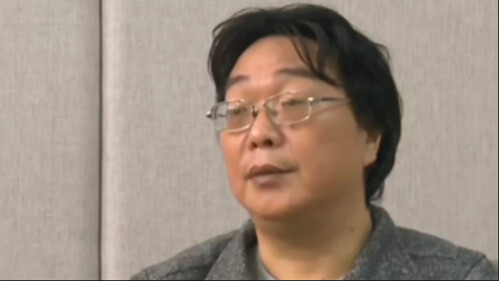 |
| A screen grab of a screen grab - not many photos are available |
Hmmmmmmmmmmmmm. Do you think it could be...?
Yeah, I do.
The rest of Europe, as noted above, seems to understand the gravity of the situation. I have to wonder why the Swedish government doesn't.
Certainly, China wants the world to think that Gui is Chinese and this is a Chinese matter. Gui is not Chinese; he may have been born in Ningbo, but China doesn't recognize dual nationality. The day Gui became Swedish is the day he stopped being Chinese. Regardless, Chinese state thugs forced Gui to say publicly that he wanted to renounce Swedish citizenship and he "slammed the country" on television. (It is certain that this was a forced statement; there is no possibility that this is truly how Gui feels about the matter).
It is well-known that China thinks of basically every person of Chinese ancestral heritage as Chinese; their actual nationality doesn't seem to matter to the CCP. They do this by threatening Chinese students abroad, taking over Chinese-language media aimed at the diaspora and threatening loved ones who may still be in China, among other tactics.
It's also not a stretch to see that they think they can get away with holding Gui in part because he, well, looks Asian. They are betting on the rest of the world seeing this as a "Chinese" issue, not an international one, and that the world cares less about these things. Basically, China is deeply racist about such matters (thinking everyone with Chinese ancestry is Chinese and therefore subject to CCP control no matter how many generations ago their family left is racist), but they're also betting that we are racist too: that we will care less because Gui is Asian.
Why do I say this? Well, compare China's treatment of Gui to their treatment of another Swede involved in China: Peter Dahlin. Gui published books - legally - that threatened the CCP's reputation. Dahlin is an activist who threatens the CCP by working with human rights lawyers in China.
Dahlin was released after a few weeks. Gui has been held for three years. Dahlin was taken in China, over actions he undertook in China; Gui was taken in Thailand over actions he undertook in Hong Kong.
I'll repeat myself: Peter Dahlin is white and has a European name. Gui Minhai looks Chinese and has a Chinese name.
China didn't want a disappeared European on their hands, so they let Dahlin go. They are betting on you not thinking Gui is European.
Don't believe me? They abducted another foreign citizen too: Lee Ming-che. Lee is Taiwanese, not Chinese. But his name is Lee Ming-che and he looks Asian. Lee was abducted in China, over actions that he took in Taiwan where he broke no laws.
Like Gui, the Chinese government wants you to think Lee is Chinese and that this is therefore a Chinese matter and none of your business. It is no such thing. They want you to fall back on old mental blocks - for you not to care as much about people with Asian faces.
Still don't believe me? Despite Swedish officials being fairly quiet about pressing for Gui's release, China has started a massive diplomatic row over a family of play-acting Chinese tourists and China's ambassador to Sweden is something of a grandstanding jerk: all of this (even according to Olsson) seems to be related to China's attempts to pressure Sweden to just forget Gui Minhai exists, and to shift the spotlight of the Sweden-China disagreement from a Swede abducted by China to a family of shrieking stooges.
Again: China wants you to forget about Gui Minhai, and Lee Ming-che too. They want you to see these foreign prisoners of the Chinese state as "Chinese", so you won't worry your pretty little head about them. The Swedish government, for some reason, seems to be playing along just enough to keep Gui out of the news. The result is that most people seem to be forgetting about him, if they knew he existed at all.
You, however, should do no such thing.
Tuesday, October 23, 2018
This Week in CHINA TENSIONS!!!!
Apparently the old way of avoiding saying that China creates tensions through its own aggressive expansionism and weaponized use of 'hurt feelings' (and century-out-of-date victimhood - more on that later) isn't harvesting as many clicks as it used to. Perhaps passive voice (those tensions - they were just...raised!) isn't thirsty enough, perhaps simply attributing these tensions to everyone but China wasn't interesting anymore.
Now, we need BIGGER and STRONGER verbs to THROTTLE readers' attention because REPORTING THE SITUATION ACCURATELY is apparently not enough.
The accurate situation: China is engaging in territorial expansionism using fabricated historical narratives to justify it. The "tensions" over Taiwan are created by China, and are a policy choice on the part of China. They are not - as someone on my twitter feed put it - a "natural reaction" to what others do. China does not suffer because the US sent warships through the Taiwan Strait. The strait is considered international waters (and this has been pointed out before). Nothing changes in China when a country sends a warship through international waters.
If anything, China is the one creating the situation where a response is necessary. If China hadn't been slowly pushing the envelope towards a world where it controlled Taiwan and the Taiwan Strait as well, the US wouldn't have felt it necessary to demonstrate that it had the right to sail ships in all international waters.
That means that China is not only choosing to respond to this with "OMG that means tensions!" but in fact that they created the tensions to begin with.
If the media reported that accurately, here is what these completely ridiculous headlines and tweets would actually look like:
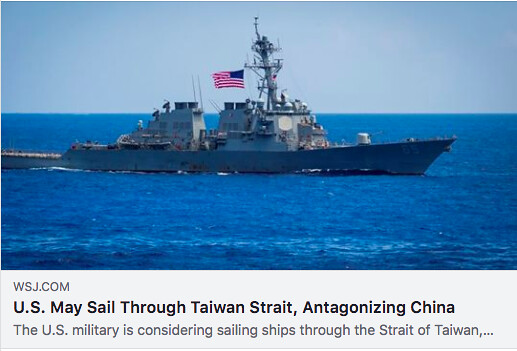
Ooh, a new one - "antagonize"! I guess simply "causing tensions" wasn't eye-catching enough.
But it should be:
"US May Sail Through Taiwan Strait In Response To Chinese Antagonism In Region"
(This was later changed to "provoking", which isn't much better.)
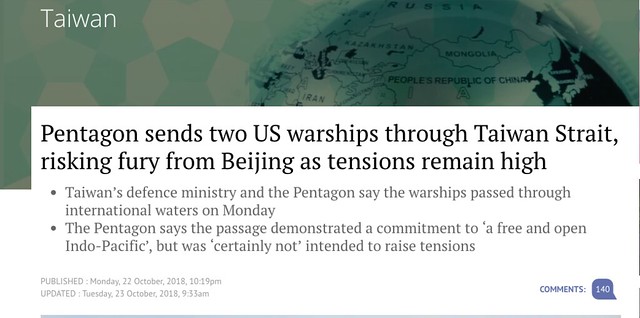
Wow, fury! Really? Actual fury? What has China got to be "furious" about when another country sails ships in international waters, unless it is choosing to be furious?
Nope, let me fix that for you:
"Chinese aggression against Taiwan risks U.S. fury, Pentagon sends two warships into nearby international waters"
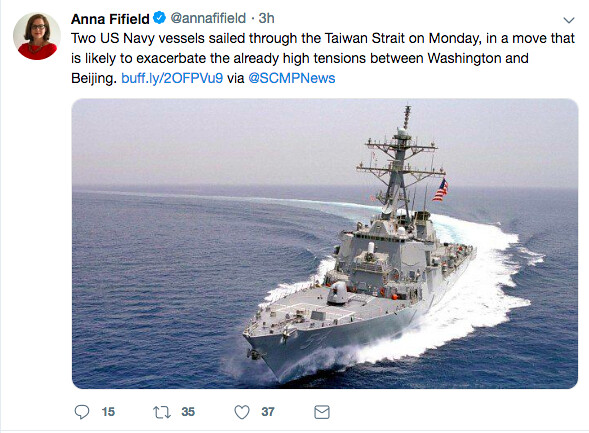
EXACERBATE! Hah.
I'm especially saddened by this tweet, because the Beijing bureau chief of the Washington Post should understand the region better than this. Anyway, her tweet would more accurately read:
"Two US Navy vessels sailed through the Taiwan Strait on Monday, in a move that warns China against further exacerbating tensions with Taiwan"
Let me add - "already high tensions" - where did these tensions come from? Who created them? In whose interest is it for those tensions to remain high? Who keeps getting angry?
You know the answer is "China", so why does your tweet imply that the U.S. is to blame?
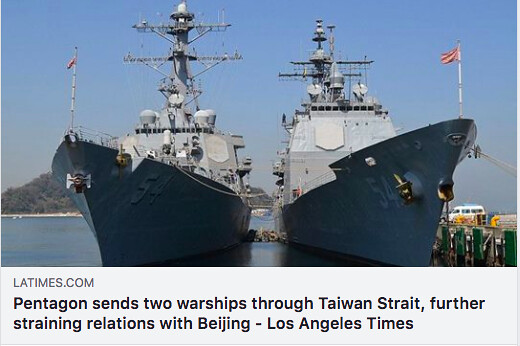
Oh man. LA Times finally got someone other than Ralph "I hate Taiwan" Jennings to write about Taiwan, and they still come out with this garbage. What's even more annoying is that the most salient quote is in the article itself:
“The ships’ transit though the Taiwan Strait demonstrates the U.S. commitment to a free and open Indo-Pacific,” said Lt. Rachel McMarr, a spokeswoman for the U.S. Pacific Fleet. “The U.S. Navy will continue to fly, sail and operate anywhere international law allows.”
So, if you have to report on this at all (which you don't), maybe try:
"Pentagon sends two warships through Taiwan Strait as warning to Beijing to cease raising tensions"
or even:
"Why is China angry about the Pentagon sending two warships through international waters?"
And your laugh of the day:
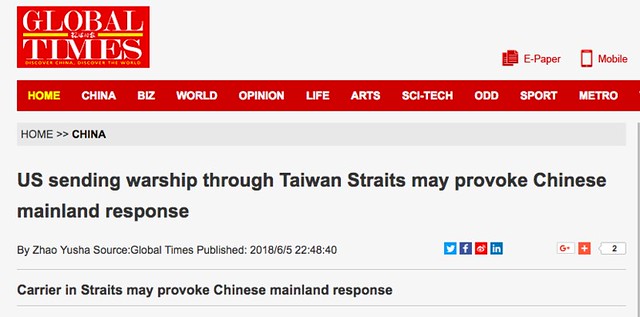
China provoked a US response, not the other way around. But this is Global Times, who cares. But let's play anyway:
"China's actions in Taiwan Straits [sic] provoke US response of sending warship through international waters"
* * *
This worries me, because I fear the way these things are being reported won't change. Newly-minted journalists will feel they have to stick to the old lines to get published and won't insist on accurate wording, editors will continue to edit pieces on topics they know nothing about, and actual bureau chiefs (jesus) will EXACERBATE the problem by sharing news that makes it seem as though this situation is everyone's fault but China's.
They know better: like with Chinese "tensions", it's a choice to publish headlines this obtuse and backwards.
It also worries me because China will absolutely continue to use this to their advantage, and nobody will say anything. Then the US will respond to China's actions. Or Taiwan will. And everyone will jump on that, pointing fingers at the U.S. and Taiwan and saying "these guys are exacerbating tensions!"
It makes it impossible to respond to China, when China's own actions are not held up to the same standard. When they are not objectively considered.
Again, this is a choice. They know better. They are helping an authoritarian regime look like a victim, and therefore helping them expand not only their territorial claims but their attempts to export authoritarianism. They are aware of this. Yet they continue to do it.
And, finally, it worries me because China is taking its cues from nobler causes in the West. It's looking at how we legitimately talk about historical victimization and how that affects modern society (think: arguments about inheriting tangible and intangible generational wealth vs. inheriting trauma while still being discriminated against).
It's taking that - a real, legitimate argument - and twisting it around to weaponize its own "century of humiliation". It is the most powerful actor in Asia, has taken by force most of the territory it says it wants (which is mostly full of people with distinct cultural backgrounds who don't want to be ruled by China), and is an economic powerhouse.
In whatever ways China was victimized in the past - and it certainly was - its claim on Taiwan is not an extension of that. Not historically, not culturally, not legally. The government that rules China now has never ruled Taiwan, and if we're going to talk "antiquity", has only in recent history even considered that Taiwan could possibly be Chinese.
Let me say that again for the people in the back: even if a historical argument supported China's claims on Taiwan, which it doesn't, it wouldn't matter. Taiwan has a culture, sense of history and identity that differs from China now, and they do not want to be a part of China ever. China doesn't get to have an opinion on the future of a territory it does not hold, and which its current government (with its current borders) has never held.
China can whine and cry and play victim, but the fact that it does not have Taiwan is not a facet of its historical victimhood. And even if it were, there is no just world in which the lives of 23.4 million people are an acceptable form of reparations.
And yet all of these headlines about 'antagonizing', 'exacerbating' and 'provoking' China make it sound as though it is. As though China is still being bullied like it's the Opium Wars or something. As though it isn't the one upping the ante, with Taiwan and the U.S. responding.
This is the best possible headline, by the way:
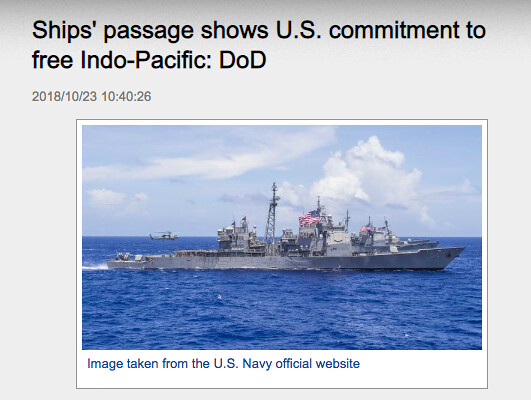
It's from Focus Taiwan so will obviously show Taiwan's point of view, but that happens to also be the accurate point of view in this case, even incorporating a quote from a U.S. military spokesperson.
You know this, journos, yet you report all that other garbage anyway.
Seriously. Quit it.
Now, we need BIGGER and STRONGER verbs to THROTTLE readers' attention because REPORTING THE SITUATION ACCURATELY is apparently not enough.
The accurate situation: China is engaging in territorial expansionism using fabricated historical narratives to justify it. The "tensions" over Taiwan are created by China, and are a policy choice on the part of China. They are not - as someone on my twitter feed put it - a "natural reaction" to what others do. China does not suffer because the US sent warships through the Taiwan Strait. The strait is considered international waters (and this has been pointed out before). Nothing changes in China when a country sends a warship through international waters.
If anything, China is the one creating the situation where a response is necessary. If China hadn't been slowly pushing the envelope towards a world where it controlled Taiwan and the Taiwan Strait as well, the US wouldn't have felt it necessary to demonstrate that it had the right to sail ships in all international waters.
That means that China is not only choosing to respond to this with "OMG that means tensions!" but in fact that they created the tensions to begin with.
If the media reported that accurately, here is what these completely ridiculous headlines and tweets would actually look like:

Ooh, a new one - "antagonize"! I guess simply "causing tensions" wasn't eye-catching enough.
But it should be:
"US May Sail Through Taiwan Strait In Response To Chinese Antagonism In Region"
(This was later changed to "provoking", which isn't much better.)

Wow, fury! Really? Actual fury? What has China got to be "furious" about when another country sails ships in international waters, unless it is choosing to be furious?
Nope, let me fix that for you:
"Chinese aggression against Taiwan risks U.S. fury, Pentagon sends two warships into nearby international waters"

EXACERBATE! Hah.
I'm especially saddened by this tweet, because the Beijing bureau chief of the Washington Post should understand the region better than this. Anyway, her tweet would more accurately read:
"Two US Navy vessels sailed through the Taiwan Strait on Monday, in a move that warns China against further exacerbating tensions with Taiwan"
Let me add - "already high tensions" - where did these tensions come from? Who created them? In whose interest is it for those tensions to remain high? Who keeps getting angry?
You know the answer is "China", so why does your tweet imply that the U.S. is to blame?

Oh man. LA Times finally got someone other than Ralph "I hate Taiwan" Jennings to write about Taiwan, and they still come out with this garbage. What's even more annoying is that the most salient quote is in the article itself:
“The ships’ transit though the Taiwan Strait demonstrates the U.S. commitment to a free and open Indo-Pacific,” said Lt. Rachel McMarr, a spokeswoman for the U.S. Pacific Fleet. “The U.S. Navy will continue to fly, sail and operate anywhere international law allows.”
So, if you have to report on this at all (which you don't), maybe try:
"Pentagon sends two warships through Taiwan Strait as warning to Beijing to cease raising tensions"
or even:
"Why is China angry about the Pentagon sending two warships through international waters?"
And your laugh of the day:

China provoked a US response, not the other way around. But this is Global Times, who cares. But let's play anyway:
"China's actions in Taiwan Straits [sic] provoke US response of sending warship through international waters"
* * *
This worries me, because I fear the way these things are being reported won't change. Newly-minted journalists will feel they have to stick to the old lines to get published and won't insist on accurate wording, editors will continue to edit pieces on topics they know nothing about, and actual bureau chiefs (jesus) will EXACERBATE the problem by sharing news that makes it seem as though this situation is everyone's fault but China's.
They know better: like with Chinese "tensions", it's a choice to publish headlines this obtuse and backwards.
It also worries me because China will absolutely continue to use this to their advantage, and nobody will say anything. Then the US will respond to China's actions. Or Taiwan will. And everyone will jump on that, pointing fingers at the U.S. and Taiwan and saying "these guys are exacerbating tensions!"
It makes it impossible to respond to China, when China's own actions are not held up to the same standard. When they are not objectively considered.
Again, this is a choice. They know better. They are helping an authoritarian regime look like a victim, and therefore helping them expand not only their territorial claims but their attempts to export authoritarianism. They are aware of this. Yet they continue to do it.
And, finally, it worries me because China is taking its cues from nobler causes in the West. It's looking at how we legitimately talk about historical victimization and how that affects modern society (think: arguments about inheriting tangible and intangible generational wealth vs. inheriting trauma while still being discriminated against).
It's taking that - a real, legitimate argument - and twisting it around to weaponize its own "century of humiliation". It is the most powerful actor in Asia, has taken by force most of the territory it says it wants (which is mostly full of people with distinct cultural backgrounds who don't want to be ruled by China), and is an economic powerhouse.
In whatever ways China was victimized in the past - and it certainly was - its claim on Taiwan is not an extension of that. Not historically, not culturally, not legally. The government that rules China now has never ruled Taiwan, and if we're going to talk "antiquity", has only in recent history even considered that Taiwan could possibly be Chinese.
Let me say that again for the people in the back: even if a historical argument supported China's claims on Taiwan, which it doesn't, it wouldn't matter. Taiwan has a culture, sense of history and identity that differs from China now, and they do not want to be a part of China ever. China doesn't get to have an opinion on the future of a territory it does not hold, and which its current government (with its current borders) has never held.
China can whine and cry and play victim, but the fact that it does not have Taiwan is not a facet of its historical victimhood. And even if it were, there is no just world in which the lives of 23.4 million people are an acceptable form of reparations.
And yet all of these headlines about 'antagonizing', 'exacerbating' and 'provoking' China make it sound as though it is. As though China is still being bullied like it's the Opium Wars or something. As though it isn't the one upping the ante, with Taiwan and the U.S. responding.
This is the best possible headline, by the way:

It's from Focus Taiwan so will obviously show Taiwan's point of view, but that happens to also be the accurate point of view in this case, even incorporating a quote from a U.S. military spokesperson.
You know this, journos, yet you report all that other garbage anyway.
Seriously. Quit it.
Yes, Ko Wen-je said a sexist thing again
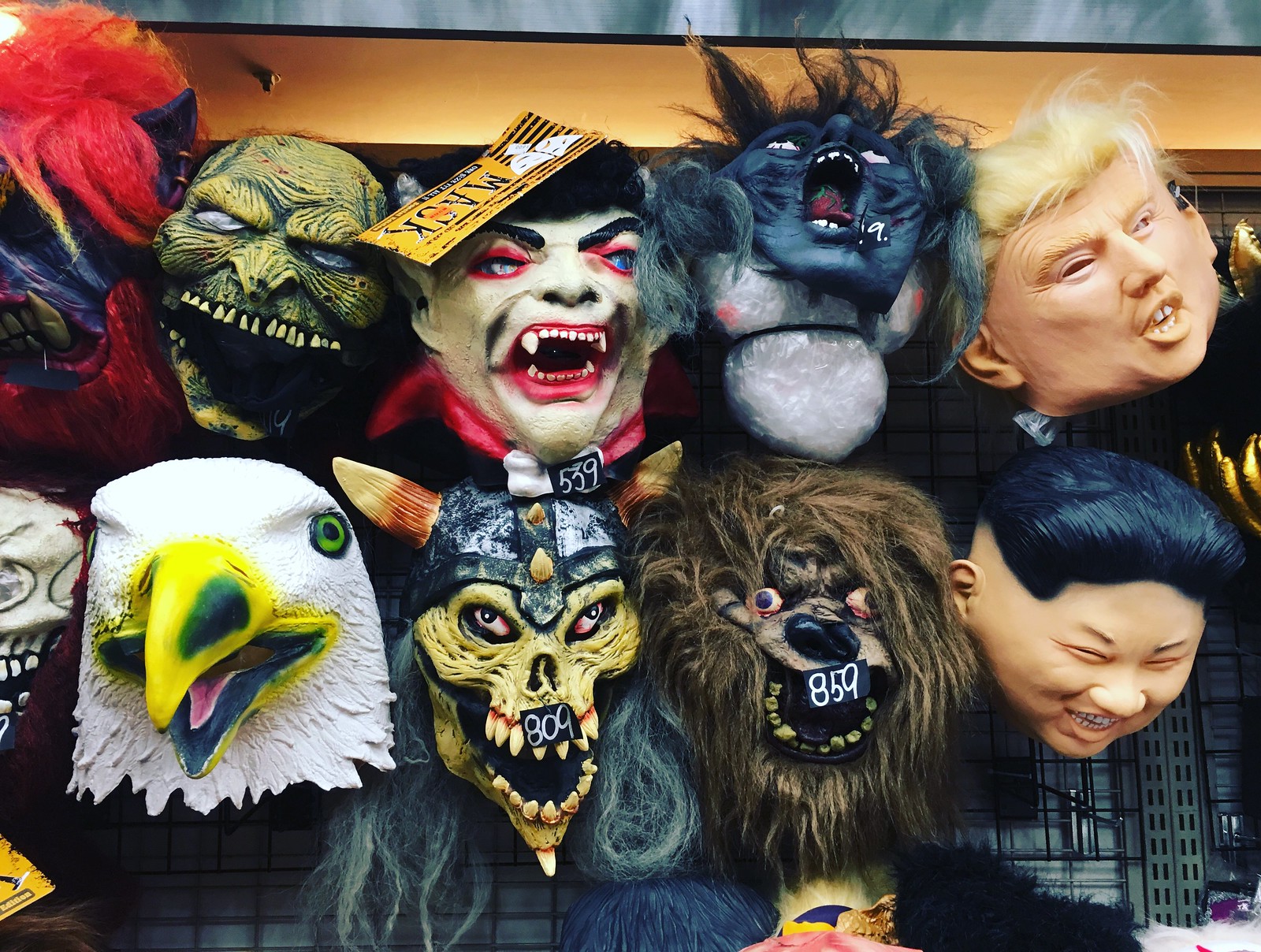 |
| The ladies of Taipei according to Ko Wen-je |
So, it's time we all just admitted frankly that Ko Wen-je is a sexist jackass.
This time, it's over comments that "Japanese women make themselves up more beautifully" than Taiwanese women, with Taiwanese women not wearing makeup "go directly outside and terrify people", and that being aesthetically pleasing not only shows dedication but is a responsibility (presumably, of women).
I mean, I totally understand. What with Ko Wen-je being such a well-manicured hottie, he sure takes great care of his 'aesthetics' and women can't help swooning over him, I mean, just look at that carefully-maintained visage that makes ladies' hearts go a-flutte - -
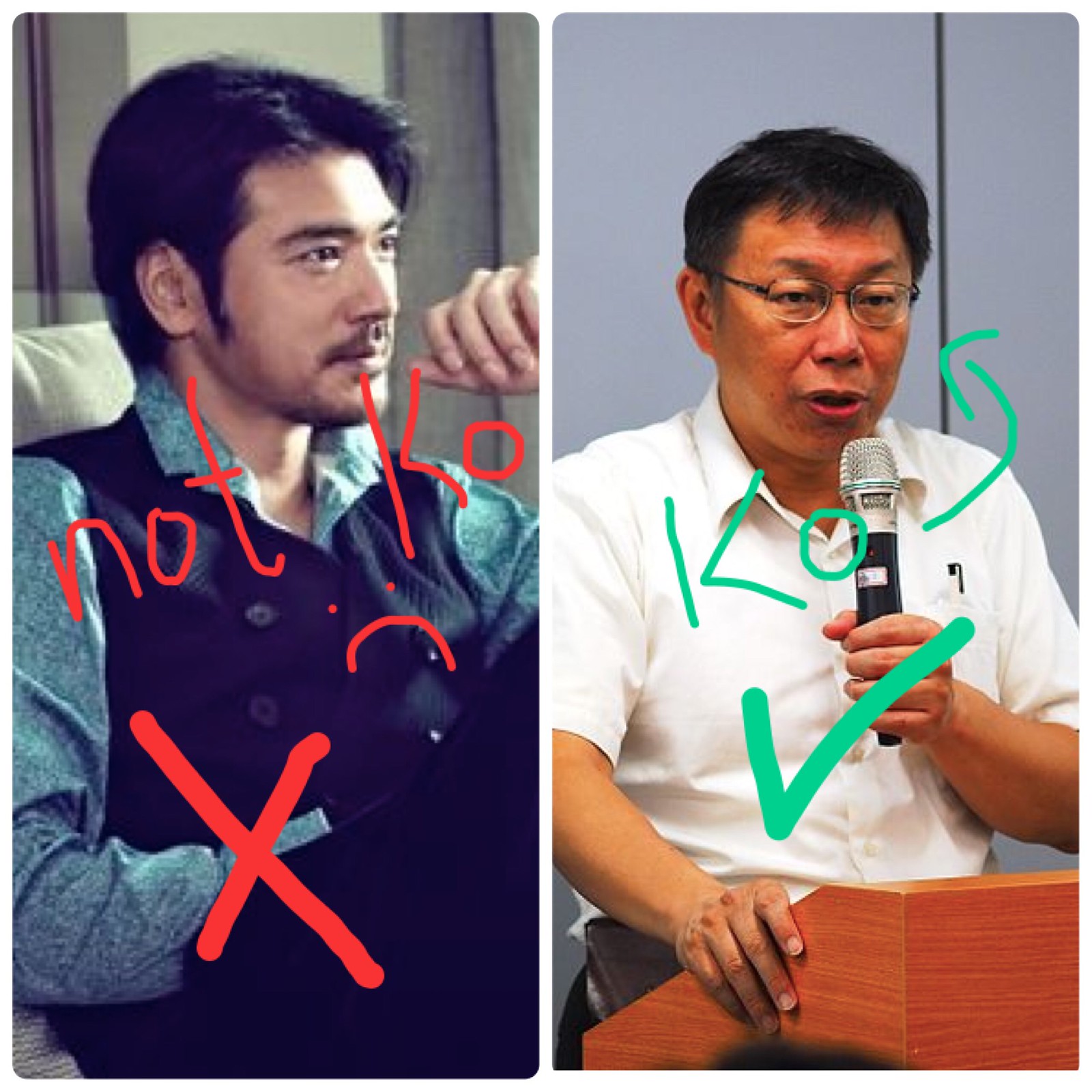 |
| Oh yeah THAT guy really has standing to talk about how women need to make themselves prettier. |
Oh, wait, that's not him. Sorry. The other guy is Ko. Hmm. Gotcha.
Do you like gardening, Mayor Ko? Because that is one massive glass house ya got there.
Obviously, it bothers me that the mayor of the city I live in, who is likely to be re-elected, is a sexist jerk.
It bothers me that he remains popular despite being a sexist jerk (if he'd committed actual sexual harassment he'd probably be a goner politically, but apparently stupid, sexist comments aren't enough), and that the media seem to cover for him.
I mean, there's no excuse for his recent comments, but please enjoy some smokescreens for sexist comments in the past:
Ko "clarifies" that both unmarried women and men over 30 are a "national security risk" (note verb choice)
"Gaffe-prone" Ko says he's "still learning to be a politician", which sounds like apologia for comments that are shitty even when non-politicians make them - note the way the prominence of Ko's "explanation" and the use of "gaffe" downplay the nature of what he actually said. And not just one thing - this is over two separate comments, both of which were horrible!
It also implies, from Ko's perspective, that everyday men say these things and that's OK (men I know have assured me they and other men typically don't, even in all-male company), but politicians shouldn't. No, dude. You shouldn't make comments that a woman is "so pretty" that she's not fit to be mayor but that she should instead "be a receptionist or model for tourism promotion materials", or "I didn't become a OB-GYN because I'd have to make a living between women's legs" even if you are not a politician. So there's nothing to "learn" to not say about women in order to be mayor. You're just an asshole.
You really think after these sorts of comments that the women of Taipei think you can do a good job as their elected representative? What woman would want to be governed by you?
So, this time around, let's not do that, okay? Let's call it what it is. Ko Wen-je definitely has his distinct personality and so he makes off-color remarks. Fine. I do that too! I live for off-color things (as long as they're not mean to the wrong people). But can we just admit that off-color sexist remarks belie sexist beliefs no matter your personality? Thanks.
But what bothers me more is that he's the best choice we've got in the upcoming election.
I don't care about one stupid comment, not really. I care that he keeps making them and yet there's no other solid choice to vote for.
I'm not writing this stuff because I want to trash Mayor Ko for no reason, and I'm not writing it because I want him to lose the upcoming election (what I say here won't matter in that regard anyway). I'm aware that the other two choices are worse: Ting Shou-jung is a China-loving, anti-independence sack of empty slogans and Pasuya Yao...I mean, lol.
If anything, that's the problem: Ko is a jackass - a smart, hardworking jackass, but a jackass nonetheless - yet we don't have a better choice. We finally get the first non-KMT mayor since Chen Shui-bian and he's...a jackass. It burns.
Monday, October 22, 2018
You don't adopt Taiwan, Taiwan adopts you: a book review of Formosa Moon
I used to believe that I’d adopted Taiwan, but the truth is, Taiwan adopted me, taking me in when I was in my early twenties and giving me a series of increasingly interesting reasons to stick around....Six months ago, I brought the love of my life to Taiwan. The idea was ostensibly to convince her to love Taiwan much in the way that I did. In this I believe I’ve met with some success.
- Joshua Samuel Brown, Formosa Moon
(by Joshua Samuel Brown and Stephanie Huffman, ThingsAsian Press, 2018 - buy it here - and if you're in Taipei, there's a launch party this weekend)
I've heard people say that the best travel writing to read is about places you've never been: places foreign and "exotic" (how I hate that word) that you know next to nothing about, but come to understand in some small way through a guided journey by the author. If I'd ever quite bought into that, Formosa Moon cured me of it, reminding me that there is an earthier satisfaction in reading other peoples' experiences in places you know well.
Although none of the places mentioned in Formosa Moon were new to me (well, some of the hotels and restaurants mentioned were, such as the Dive Cube hotel), there's a certain beauty in reading about a place you're so familiar with that you can smell the air, see the details of the parks and unkempt sidewalks, picture the mountains, know intimately what kind of trees are growing all around and what it's like to live your life in a series of tiled buildings.
A section of the book takes place at Sun Moon Lake. Been there, didn't love it. Another one describes National Chengchi University. My sister studied there for a year. The Dome of Light? I was there two weeks ago. Tainan? I go every time I get the chance. Jiaoxi? Several visits, soaked in the public hot spring too. Huwei? I'm one of the few foreigners who went to Yunlin for fun over a Dragon Boat weekend just to see what it was like.
But there's something deeper about Formosa Moon that I just get. I think pretty much everyone who's made a life here - that is to say, many if not most of my closest friends at this point - understand as well. Taiwan is like a cat: you don't adopt a cat. A cat adopts you.
You might come here thinking you're going to just "go abroad for a few years" and do that privileged First World thing by teaching English to fund your time in Asia (you're probably not an actual English teacher). You might stay for 1, 2, 3 years: most of the cram school crowd seems to turn over in roughly those increments. Some of you won't get it: the traffic - there are traffic laws, I swear - the pollution, the ugly buildings (you will almost certainly live in one of these), the humidity, the long or weird working hours and greatly reduced career options, the crowds will all collude to gently push you out. Or maybe none of them will, and you'll enjoy your time here just fine, but when the clock is up it's up, and you were always going to return to the place you know is home anyway. Taiwan didn't adopt you. That's OK.
Some of you will fall in love here, or find your groove, or take an interest in Taiwan's unique history, or build a community. Or it'll be the damp hills, the palm trees, the local aunties, the 7-11s, the traditional markets. Or you'll watch a major social movement unfold up close and realize Taiwan is a place and a cause worth fighting for. Something about life here will speak to something inside you, and you'll stay. You probably didn't consciously choose to. You were adopted.
In this way, I found it appropriate that Formosa Moon heavily featured cats, though they popped up in the narrative for no particular reason, and certainly not in any planned thematic way. It just did. From the cats of Houtong (another place I know well, and have started hikes from) to the painted cats (among other fantastic creatures) of Rainbow Grandpa to Joshua's friend's cats which provided a cozy sense of home to Stephanie - the other writer of the book - I found the unexpected feline leitmotif to fit. Taiwan not only adopts you like a cat (or it doesn't), but it can be as cool, beguiling or mercurial as a cat, or as winsome and homey as one too. You know your cat loves you, but you're never quite sure how much.
Or, to put it another way:
Taiwan is kind, to its native born, adopted children, and short-term guests alike. But Taiwan doesn’t change its tempo for you. Instead, you must change your tempo to adapt to Taiwan. And this will make all the difference.
Of course, you get to wax lyrical about all of this because you chose to come for reasons other than making a basic living. Supporting yourself may have had something to do with it, but you could have done that where you'd come from. You're aware that exponentially larger numbers of foreign residents in Taiwan had no such privilege. (You are aware of that, yes?)
All this is not to say that only those who know Taiwan should read Formosa Moon. I'll certainly recommend - if not outright purchase as gifts - copies of the book for loved ones back home who perhaps don't get it, most of whom because they've never visited. It describes the country well, and even the pictures (which are very "homey", not glossy professional shots, which I see as a plus) show in accurate detail what life in Taiwan is like.
As the book itself points out, cities like Kyoto (or Shanghai or Singapore or these days, Seoul) beckon to the Western traveler who is planning their first trip to Asia. Most travelers don't think of "Asia" and immediately think "Taipei". So they don't come, and therefore, they don't know. Formosa Moon, I hope, might tempt some of them into finally visiting to see for themselves why I've chosen to stay for most of my adult life.
And not only that, I'll recommend it for its unique perspective. Every other piece of Taiwan-focused travel writing on my bookshelf is by a white guy. I haven't cracked them all yet, but will. I'm sure they'll be fantastic; people whose opinions I trust have told me so. But, so much travel writing is done by white guys hitting the trail alone, and other narrative voices enrich the genre. I don't think I've seen a travelogue written by two partners in a relationship before, each with views that play off or add depth to the other.
As someone who also moved to Taiwan and then six months later convinced the love of my life to move here too, that appeals to me - as a woman and a person in a committed relationship. Ours took a slightly different route: he didn't know he was the love of my life when he moved here (I kind of did, but didn't tell him so right off), and our relationship evolved here, not in the US. I didn't "love Taiwan" when he moved here: my first six months here weren't that great, to be honest. I am sure I have had success, however, in convincing him to love this country as much as I do. We show it in different ways, but I know.
More poignantly, Formosa Moon captures what it's like to be both in a relationship with a person, and with a country. We never had to face the challenge of Brendan liking Taiwan; he did immediately, on his first visit here. I wasn't sure then how much I liked Taiwan: I didn't decide to make the commitment until three years later. That was when I'd been planning to decide if I'd stay or go; it also happened to be the year we got married. I suppose our somewhat weirdly polyamorous love grew together.
Of course there's a bittersweetness to every love story. You know how they say that in a relationship, someone always loves more, and the other less? And the one who loves less has all the power?
Although I know I can never truly be "a local" (forget not looking the part: it's just not my native culture), I want to stay and advocate for Taiwan, and gain legal rights - not just privileges accorded me out of courtesy as a permanent resident, which can be revoked. I don't expect a perfect life here. It would be nice, however, if in my relationship with Taiwan I didn't always feel like I was the one who loved more. I like to think that by opening myself up to Taiwan, that Taiwan has opened to me a little. I'll never know how much, though.
I'll end, then, on a particular salient quote from co-Stephanie Huffman:
Taiwan and I were certainly friends but had we really progressed to a love state? I didn’t know even know how Taiwan felt about me and I certainly wanted some indication of her feelings before I made any commitments.
Yup. Except I did that thing that relationship advice columnists say never to do: I made the commitment without knowing quite how she felt about me.
Still here though. You see, I was adopted.
Subscribe to:
Comments (Atom)

